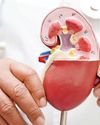
East Delhi resident Gaurav Kumar has entirely shifted to Jan Aushadhi Kendras for medicinal needs. He unequivocally dismisses doubts over the quality of drugs sold at the Centre-run kiosks. "The price difference is also whopping, 50-90 per cent," he says. Anil Vats, a retired government servant from Ghaziabad, says: "My lung disease tablets cost ₹250 per pack. At Jan Aushadhi, I get it for ₹60."
To ensure quality, all batches supplied to over 10,000 Jan Aushadhi stores across 750 districts go through double checks. Ravi Dadhich, CEO, pharmaceuticals and medical devices bureau of India, ministry of chemicals and fertilizers, tells THE WEEK: "After procuring medicines from WHO GMP (Good Manufacturing Practices) certified suppliers, each batch is again tested at our laboratories to ensure quality."
Certainly, these stores are striving to provide affordable generic medicines. This, however, is only a small part of the story. The ecosystem of generic drugs in India is far too wide and cumbersome. Generic or branded medicines have no specific definitions. They, for all purposes, generally "contain the same active ingredient in the same dosage form, intended to be administered by the same administrative route" as the branded drugs.
Dr Preeti Kumar, vice president, public health system support of the Public Health Foundation of India, explains: "There are primarily three types of drugs-generic, brandedgeneric and patented." She adds that the generic and patented together constitute around 20 per cent of the market. "The remaining 80 per cent is covered by branded-generics that constitute around 2,800 formulations and unique molecules for various diseases spanning over 55,000 brands," she says. "If we keep the patented drugs aside (which is only 8-10 per cent), the issue of quality remains with both generic and branded-generics and it is not entirely correct to equate branded-generic with quality."
Bu hikaye THE WEEK India dergisinin May 05, 2024 sayısından alınmıştır.
Start your 7-day Magzter GOLD free trial to access thousands of curated premium stories, and 9,000+ magazines and newspapers.
Already a subscriber ? Giriş Yap
Bu hikaye THE WEEK India dergisinin May 05, 2024 sayısından alınmıştır.
Start your 7-day Magzter GOLD free trial to access thousands of curated premium stories, and 9,000+ magazines and newspapers.
Already a subscriber? Giriş Yap

WHEN THE FILTERS FAIL
With chronic kidney disease on the rise in India, THE WEEK spoke to four patients to chronicle their struggles and hopes

STROKE SURVIVORS HAVE A HIGHER RISK OF DEMENTIA
ABOUT ONE-FIFTH OF STROKE survivors will eventually get a diagnosis of dementia, finds a Canadian study published in the journal Neurology.

Highs and lows of aviation safety
A recent spate of fatal air accidents around the world has once again sparked a debate about aviation safety. With India's aviation sector being the fastest growing in the world, this should interest all Indians. As an active pilot for three decades, it is certainly of great interest to me.

IS SEATED OR SUPINE BLOOD PRESSURE MEASUREMENT MORE ACCURATE?
A STUDY FROM HARVARD UNIVERSITY, published in JAMA Cardiology, found that patients who had elevated blood pressure while lying down (supine position) were at a higher risk for heart disease, stroke, and death-even if their seated blood pressure readings were normal.

Beating cervical cancer
When detected early, it is highly treatable with good outcomes

REGULAR FLOSSING MAY REDUCE RISK OF STROKE/AFIB
REGULARLY FLOSSING YOUR TEETH may not only protect your gums, but also lower your risk of stroke as well as irregular heart rhythms such as atrial fibrillation.

TWIN PREGNANCIES DOUBLE THE RISK OF HEART DISEASE
MOTHERS OF TWINS are twice as likely to be hospitalised for heart disease in the year after delivery, according to a US study published in the European Heart Journal. The risk is even greater for mothers of twins who had high blood pressure during pregnancy.

Banking on biosimilars
The pharmaceutical industry is experiencing a biosimilar boom, and India is among the best-positioned countries to capitalise on it. Biosimilars are biological medicines that closely resemble an already-approved reference biologic.

PREHABILITATION BEFORE SURGERY IMPROVES OUTCOMES
WHAT IS PREHABILITATION, or prehab? It refers to the process of preparing for a surgery by exercising and eating a nutritious diet to improve surgical outcomes.

CULTURE IN A CLAY POT
Chef Regi Mathew takes Kerala cuisine to New York with Chatti, hoping to showcase the immense potential of Indian regional food